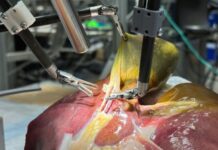New Delhi, 31st August 2020: OMRON Asia Pacific has announced the launch of the world’s first “Robotics Integrated Controller”. It perfectly synchronizes automation technology so customers can improve the speed and accuracy of their production, simulate entire production equipment without having to deploy physical equipment, simplify maintenance, and reduce time-to-market during the design, planning, commissioning, and changeover processes. With this, OMRON is now able to provide a highly automated manufacturing site which does not require over-dependency on human resources due to the COVID-19 circumstances.
At the heart of the new platform is a new machine controller, which offers real-time synchronization between all automation equipment, including robots, vision components, drives, and safety equipment. The new NJ501-R controller is based on OMRON’s industry leading NJ series of machine controllers for industrial automation. By using the “Robotic Integrated Controller,” it has become possible to automate advanced and complex manual work that had been previously completed by human workers. Also, users may now simulate the design and modification of production facilities in a virtual environment, establish equipment, and conduct maintenance remotely.
Industries are facing labor shortage issues in recent years, moreover, the world is experiencing a major turning point with how society conducts business due to new global health concerns. Employees throughout the world must maintain social distancing in manufacturing sites, limit business trips, and work remotely. As a result, the demand of more advanced automation by robots has been increasing, along with a growing demand for digitalization.
Traditionally, automation equipment for production facilities has typically been controlled by a number of different controllers creating a major challenge to setup and coordinate the speed and timing between various devices. Until recently, it has been extremely difficult to automate human tasks that are sophisticated and complex. Also, it was very difficult to verify a process design in advance and with a high level of accuracy prior to construction of a machine or larger production line. After the equipment is commissioned, adjustments need to be made onsite and backtracking and specification changes are common, resulting in a huge number of man-hours.
OMRON produces the motion sensors, robotics, and safety equipment needed to deploy a fully automated production line. The “Robotic Integrated Controller” is a solution which addresses challenges that manufacturing sites have previously encountered. OMRON has addressed these issues by seamlessly integrating control equipment. The “two integrations” described below will help solve the problems many customers face in manufacturing sites.
Control Integration
The advanced and seamless control of the “Robotic Integrated Controller” automates inserting and assembling processes that require delicate and skillful processing. The robots and equipment are controlled and fully synchronized in real-time by a single controller, improving device performance, and achieving the world’s highest level of throughput*².
Integration of the Construction Process
OMRON has established a technology that unifies the programming languages for robot and machine control, making it easy to simulate your production line with single programming software. PLC engineers are now able to easily design robot controls and entire production systems, including all motion, sensor, robotics, and safety equipment. Production lines can be simulated virtually, and the operation capacity can be determined before the commissioning of the facility. The system visualizes the process, reducing man-hours for process design and operational verification by up to 50%*³. Furthermore, all of this can be conducted remotely. Through Sysmac Studio’s user interface, users can design, program, troubleshoot, operate and maintain future automation systems remotely from anywhere in the world.
OMRON has a unique concept called “innovative-Automation.” With the introduction of the “Robotic Integrated Controller,” OMRON is accelerating the evolution of the three “i’s” of innovation: integrated, intelligent, and interactive. In particular, “automation of complex tasks”, “automation of highly coordinated machine to machine operation”, and empowering users in their efforts to transform the manufacturing floor to adapt to modern challenges by providing “a manufacturing site that is virtual and free of space and time constraints,” making the automation of these processes a reality.
Key Features and Benefits of the Integrated Controller:
- By integrating the PLC, motion, and robot control in a single controller, complex manual work that could only be conducted by humans can now be completed by robots. This integration automates skilled workers’ techniques in the manufacturing field and realizes highly synchronized robots and equipment.
- The programming language for the PLC and robot is unified in the generic IEC language, which allows engineers who typically manage PLCs the ability to also manage robots as well.
- With OMRON’s simulation technology, one can verify equipment performance at the early stage of equipment design, allowing mechanical designers and electrical designers to design in parallel. As a result, equipment commissioning can be completed in a shorter period, higher production capacity can be achieved, and mistakes and setbacks during equipment commissioning can be avoided.
- To run the simulation, the user can use the emulation function in Sysmac Studio. The system does not require a connection to the actual machine for operation verification. Also, the production capacity of the robot equipment can be monitored digitally.
- By re-using previous digitalized assets, it is easier to establish the next facility.
*¹ The world’s first: November 2019, according to the OMRON research.
*² Highest level: November 2019, according to the OMRON research.
*³ 50%: July 2020, according to the OMRON research.To enquire about the product, click here.

















